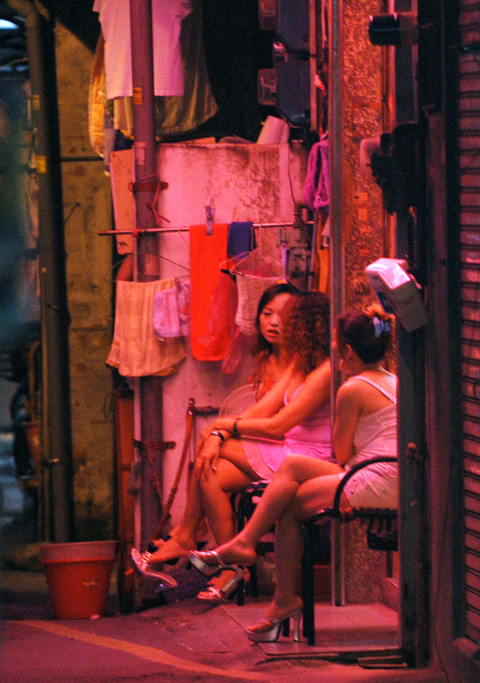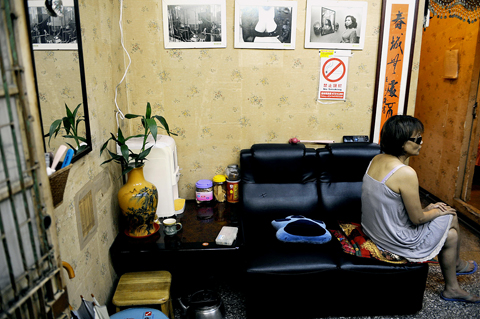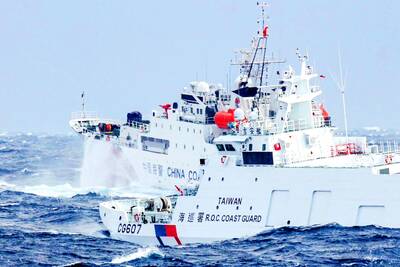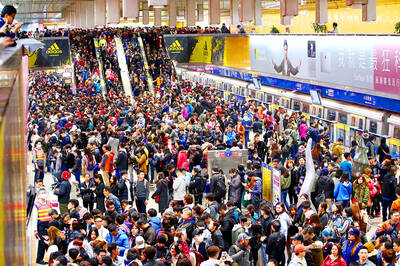Sex workers have cautiously welcomed a government plan to legalize prostitution, but the scheme is being opposed by an alliance of women’s groups who fear it will breed crime and violence.
A legal sex zone similar to Amsterdam’s famed red-light district has been proposed for Taipei, with legal and zoning measures due in place within six months.
Prostitutes and their supporters say they see a ray of hope after many years of campaigning for legalization to protect them from both customers and police, but some are concerned about being moved into special zones.

PHOTO: AFP
“I hope the government will allow us to stay where we are and give us legal protection,” said one prostitute who wanted to be identified as Hsiao-feng. “I don’t want to move to a new place to start again.”
Hsiao-feng earns a living in Wanhua District, which is believed to be home to thousands of sex workers plying their trade illegally even though prostitution was outlawed in the city in 1997.
“Who wants to have red-light districts near their homes?” she said. “The government would have to put us in the mountains but then we can’t make a living because nobody wants to travel that far.”

PHOTO: AFP
Observers say paid-for sex remains big business and the ban has only driven it underground, where brothels operate under euphemistic names such as teahouses, massage parlors, clubs and even skin-care salons.
There are also women known as liu ying (流鶯, floating orioles) — a metaphor for flirtatious and seductive women — who find patrons on the streets.
There is no official record on the scale of Taiwan’s sex industry but the advocacy group Collective of Sex Workers and Supporters (COSWAS) estimates that it involves 400,000 people and is worth NT$60 billion (US$1.8 billion) a year.
“Right now we are helpless when customers don’t pay, or even rob or hurt us,” Hsiao-feng said. “We have to watch out for the police and their informants because we can end up in prison if caught.”
Prostitutes face three days in detention or a fine of up to NT$30,000 if arrested, while their clients go unpunished.
“The government should protect sex workers’ human rights and stop treating them like criminals,” COSWAS chief Chung Chun-chu (鍾君竺) said. “It should allow a blanket decriminalization to regulate the sex trade.”
The public is divided on the issue, with 42.3 percent supporting the plan to legalize prostitution while 38.8 percent oppose it and the rest are undecided, a poll by the Chinese-language China Times found.
Arielle Su, an elementary school teacher in Taipei, says legalizing the sex trade cuts both ways.
“I think it can help prevent sex crimes as some people have needs and they would prey on the general public if they are unsatisfied,” she said. “But as a mother and a teacher I am also concerned that it would corrupt morals.”
A dozen local women’s groups have formed an alliance against legalizing prostitution, warning that it would encourage crime and injustice against women.
“We oppose making prostitution a legal industry because it fosters sexual violence and exploitation of women,” said Chi Hui-jung (紀惠容), head of The Garden of Hope Foundation.
Chi said that the Dutch authorities were reducing the size of Amsterdam’s red-light district because of concern over criminal activities such as human smuggling and money laundering.
“The government should offer welfare programs and job incentives to women so they won’t go into prostitution out of economic desperation,” Chi said.
Hsiao-feng, a 45-year-old divorcee, says it is difficult for streetwalkers like her, with little education and few job skills, to find regular work.
“I don’t like what I do for a living but I have to raise my children and pay the bills. I don’t regret becoming a sex worker. I just hope the government will protect my safety so I am not always at the mercy of others,” she said.

READY: The CGA said it closely monitored China’s maritime exercise, deployed vessels to shadow the Chinese ships one-on-one and set up emergency response centers Chinese navy and coast guard ships have returned to China, signaling the end of a massive maritime exercise, authorities said yesterday. The Coast Guard Administration (CGA) released images it said showed Chinese vessels sailing north in rough seas past Taiwan on Thursday, on their way to China. “All the Chinese coast guard went back to China yesterday, so although they have not officially made any announcement, we consider it over,” CGA Deputy Director-General Hsieh Ching-chin (謝慶欽) said. Beijing has not confirmed the drills and the Chinese Ministry of National Defense did not say whether the maneuvers had taken place when asked at a

People can take the Taipei MRT free of charge if they access it at Nanjing Sanmin Station or Taipei Arena Station on the Green Line between 12am and 6am on Jan. 1, the Taipei Department of Transportation said on Friday, outlining its plans to ease crowding during New Year’s events in the capital. More than 200,000 people are expected to attend New Year’s Eve events in Taipei, with singer A-mei (張惠妹) performing at the Taipei Dome and the city government’s New Year’s Eve party at Taipei City Hall Plaza, the department said. As people have tended to use the MRT’s Blue or

PUBLIC TRANSPORT: As some roads would be fully or partially closed, people are advised to take the MRT, with services expanded to accommodate more riders This year’s Taipei Marathon, which has obtained its first gold label certification from World Athletics, is to be held from 5am to 1pm tomorrow and would have 28,000 participants. The race is to start from the Taipei City Plaza and would go through major roads throughout the city, with traffic control implemented from 6am to 2pm, officials said. The Taipei Mass Rapid Transit (MRT) system and New Taipei City MRT Circle line would start operating at 5am on the day of the race, they said. The race would cover Renai Road, Xinyi Road, Hangzhou S Road, Aiguo east and west roads,

Taiwanese professional baseball should update sports stadiums and boost engagement to enhance fans’ experience, Chinese Professional Baseball League (CPBL) commissioner Tsai Chi-chang (蔡其昌) told the Liberty Times (sister paper of the Taipei Times) in an interview on Friday. The league has urged Farglory Group and the Taipei City Government to improve the Taipei Dome’s outdated equipment, including relatively rudimentary television and sound systems, and poor technology, he said. The Tokyo Dome has markedly better television and sound systems, despite being 30 years old, because its managers continually upgraded its equipment, Tsai said. In contrast, the Taipei Dome lacked even a room for referees